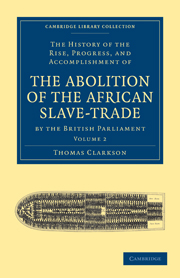Summary
The committee for the abolition could not view the proceedings of both Houses of Parliament on this subject during the year 1793, without being alarmed for the fate of their question. The only two sources of hope, which they could discover, were in the disposition then manifested by the peers as to the conduct of the Earl of Abingdon, and in their determination to proceed in the hearing of evidence. The latter circumstance indeed was the more favourable, as the resolution, upon which the witnesses were to be examined, had not been renewed by the Commons. These considerations, however, afforded no solid ground for the mind to rest upon. They only broke in upon it, like faint gleams of sunshine, for a moment, and then were gone. In this situation the committee could only console themselves by the reflection, that they had done their duty. In looking, however, to their future services, one thing, and only one, seemed practicable; and this was necessary; namely, to complete the new body of evidence, which they had endeavoured to form in the preceding year. The determination to do this rendered another journey on my part indispensable; and I undertook it, broken down as my constitution then was, beginning it in September 1793, and completing it in February 1794.
- Type
- Chapter
- Information
- The History of the Rise, Progress, and Accomplishment of the Abolition of the African Slave-Trade by the British Parliament , pp. 465 - 471Publisher: Cambridge University PressPrint publication year: 2010First published in: 1808

